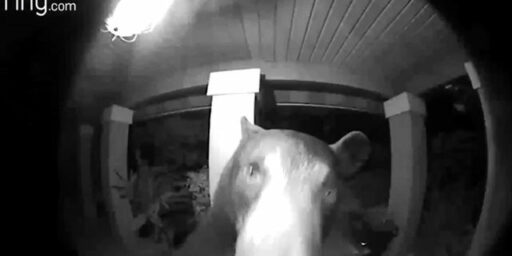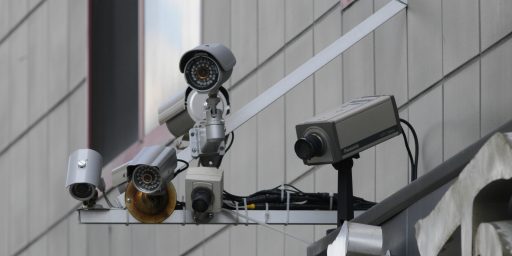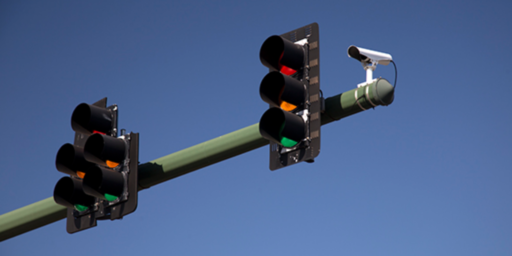Security Cameras Multiplying in American Cities
Security Cameras Multiply in Manhattan (AP)
Six surveillance cameras could be seen peering out from a chain drug store on Broadway. One protruded awkwardly from the awning of a fast-food restaurant. A supersized, domed version hovered like a flying saucer outside Columbia University. To the dismay of civil libertarians and with the approval of law enforcement, they’ve been multiplying at a dizzying rate all over Manhattan. “As many as we find, we miss so many more,” Alex Stone-Tharp, 21, said on a recent afternoon while combing the streets, clipboard in hand, counting cameras in the scorching heat.
A student at Sarah Lawrence, Stone-Tharp is among a dozen college interns enlisted by the New York Civil Liberties Union to bolster their side of a simmering debate over whether surveillance cameras wrongly encroach on privacy, or effectively combat crime and even terrorism — as in the London bombings investigation, when the cameras were used to identify the bombers.
[…]
At last count in 1998, the New York Civil Liberties Union found 2,397 cameras used by a wide variety of private businesses and government agencies throughout Manhattan. This time, after canvassing less than a quarter of the borough, the interns so far have spotted more than 4,000. The preliminary total “only provides a glimpse of the magnitude of the problem,” said NYCLU Executive Director Donna Lieberman. “Nobody has a clue how many there really are.” But aside from sheer numbers, the NYCLU says it’s concerned about the increasing use of newer, more powerful digital cameras that — unlike boxy older models — can be controlled remotely and store more images.
The group expects to eventually publicize its findings to convince the public that the cameras should be regulated to preserve privacy and guard against abuses like racial profiling and voyeurism. Privacy advocates have cited a case earlier this year in which a police videotape that captured a suicide at a Bronx housing development later turned up on a pornographic Web site. The NYCLU plans to post an interactive map on its Web site pinpointing the location of each surveillance camera, and it may include a feature for the camera-shy that would highlight the least-surveilled route between two points.
But the map could be obsolete on arrival. The Metropolitan Transportation Authority plans to spend up to $250 million (euro200 million) to install new surveillance cameras in the city’s vast subway system. The New York Police Department also has requested funding for about 400 digital video cameras to help combat robberies and burglaries in busy commercial districts.
Police officers already watch live feeds from hundreds of cameras in city housing projects throughout the five boroughs, where “they are a proven deterrent,” said NYPD spokesman Paul Browne. Elsewhere, Chicago recently spent roughly $5 million (euro4 million) on a 2,000-camera system, which has been credited for reducing crime to its lowest point in some 40 years. In Washington, D.C., Homeland Security officials have announced plans to spend $9.8 million (euro7.8 million) for surveillance cameras and sensors on a rail line near the Capitol. And in Philadelphia, where the city has increasingly relied on video surveillance, cameras caught a murder and ultimately led to the capture of a suspect.
It’s sad that we live in a world where most people no longer feel outraged by surveillance cameras. After the quick capture of the London terrorists, though, it will be even harder to roll back this trend.
The cameras may be a necessary evil. Further, the courts have long ruled that people have an exceedingly limited expectation of privacy in public venues, so the “privacy” argument is mostly theoretical. It is, however, rather ironic that the same courts gave us a constitutional right to privacy that includes the right to abortion but does not extend to being allowed to walk the streets in peace.






Camera = not allowed to walk the streets in peace.
You should get a job at the NYT.
I agree with the above comment. The problem is in the phrase “that the same courts gave us a constitutional right to privacy”
Courts can’t give Constitutional Rights. Only the Constitution can do that. If we say the courts can give it, we implicitly are setting them up to take them away.
If a cop were standing there on a “beat” you wouldn’t say anything. If the same cop was seated somewhere at the end of a camera, you have a cow.
What if you formulated this as concerning the right of other people to look and take pictures in a public place?
…I don’t see anything particularly ‘Orwellian’ about security cameras. I don’t believe that the intent is to record everything everyone is doing and store it forever, just as the hypothetical cop on the corner isn’t going to remember every face and action of everyone he sees.
If, however, we start getting questioned about why we are in a place (“We say you go into that drugstore…”), then there’s a problem. Today, the data storage, analysis capabilities and manpower to do that just aren’t there.